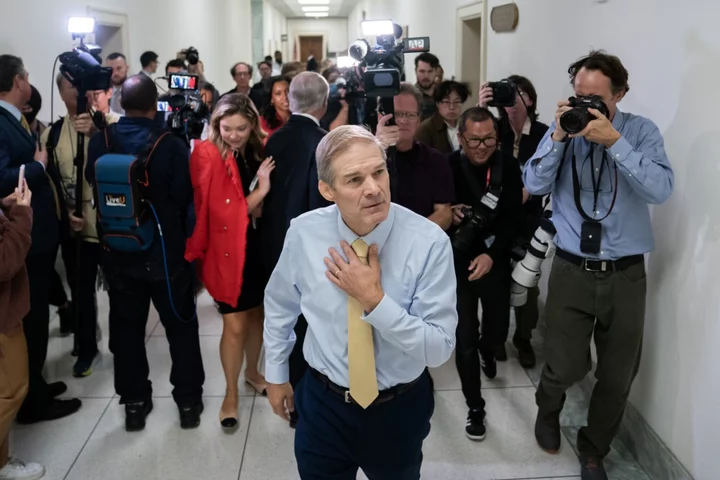Weeks of sniping back-and-forth between the White House and the Republican majority in the House of Representatives has finally yielded a deal: America will not default on its debt obligations, should Congress act and pass the legislation before Thursday. On Saturday, House Speaker Kevin McCarthy and Joe Biden announced the end of negotiations and the agreement upon a deal late into the evening, with the text of the legislation itself soon to follow. The new compromise both touches on Republican priorities while also safeguarding Joe Biden’s legislative accomplishments. But it comes after weeks of bitter fighting. Republicans accused the White House and congressional Democrats of out-of-control spending, ignoring their rivals’s derisive reminders about the debt incurred by a GOP-led tax cut passed in 2017 that largely benefited wealthier Americans. Democrats, meanwhile, blamed Republicans for holding the country’s credit rating and ability to pay its loans hostage, and for seeking cuts to social welfare programs like food assistance for needy families. As we inch closer to Thursday’s deadline, let’s take a look at what leaders in Washington have come up with to break the deadlock. No more debt drama (for now) The first and most significant achievement of this deal: it raises the debt ceiling through the end of 2024. That guarantees the GOP won’t be able to wage a fight over the issue again, particularly as the presidential campaign season heats up later this year and into the next. Any debt ceiling battle during campaign season, particularly in the summer or fall of 2024, would take Joe Biden off the campaign trail and put his focus firmly on Washington at a time when either of his likely general election opponents, Donald Trump and Ron DeSantis, would be free to continue their politicking. In total, the deal calls for raising America’s debt limit by $4 trillion. Signing away that leverage for the next year is already proving to be one of the toughest pills for congressional conservatives in both the House and Senate to swallow, especially given the lack of other major concessions in the pending legislation. Spending caps The GOP’s big win in the negotiating process, this legislation is set to freeze federal spending at the current level, with the exception of military funding, through 2024. And growth of that spending will be capped at 1 per cent if Congress cannot agree upon a stopgap spending deal in January of 2025. This is a significant restriction for the federal government over the next year, and notably puts in place much stricter spending limits than members of Congress agreed to during the last debt limit fight in 2019. The language allowing for defence spending to increase while domestic programmes face a spending freeze is already irking progressives, who have long argued that the US military’s bloated budget should be at the top of the list for reforms. Caps set by this compromise are simultaneously the biggest victory for Republicans as well as their failure; while the spending caps are certainly more than what Democrats were demanding, they also eliminate the possibility of Republicans using the debt ceiling to make real cuts to programmes already implemented by the Biden administration as part of the Inflation Reduction Act and other legislation. That means that Mr Biden’s 2021-2022 legislative agenda will remain largely intact, despite demands by conservatives to roll back huge parts of it, like efforts to forgive student loans or expand green energy production. Work requirements for food stamps One of the GOP’s efforts to stem the tide of federal spending is centred around the issue of providing food assistance to low-income families. The new legislation is set to expand work requirements for the SNAP programme from the current age cap of 49 to a new cap of 54, meaning that Americans within that age bracket will have to prove employment to receive benefits. The issue may seem oddly specific for Republicans to hold up America’s ability to pay its debts upon, but tightening the restrictions fo federal assistance has long been a target of the GOP, and originally the party wanted to expand those work requirements to Medicaid as well. The new work requirements will sunset in 2030, unless extended before then by a GOP Congress. IRS funding halted The other specific ask that Republicans managed to secure in their compromise with the White House was a halt, at least in part, to a plan to fund new hiring initiatives at the Internal Revenue Service (IRS), America’s tax collection agency. The beleaguered agency was set to receive more funding for agents that the federal government said were to assist taxpayers with filing issues and shore up the IRS’s capabilities; Republicans painted the issue instead as an effort to hire an army of IRS auditors to go after taxpayers for suspected fraud, a non-starter for the party that has long sought, particularly among its conservative wing, to diminish the power and capabilities of both the IRS and other federal agencies. But some conservatives are already complaining that the cuts aren’t enough. Congressman Chip Roy exclaimed angrily after the deal was announced that “98%” of the funding for the expansion of the IRS’s services would still go through. Covid aid The deal has one more minor win for Republicans — a provision to return Covid aid funding that has yet to be appropriated. Millions of dollars in this aid still remains unspent by the federal government, though Democrats have used it thus far to fund a number of federal health programmes which they warn could face cuts if the aid is rolled back entirely. Read More Debt ceiling agreement gets thumbs up from biz groups, jeers from some on political right President attends 2nd grandchild's graduation as daughter of Biden's late son leaves high school Democrats look set to back debt limit deal – while right-wing threatens to blow it up AP News Digest 8:40 a.m. Debt-ceiling deal: What's in and what's out of the agreement to avert US default Asylum-seekers say joy over end of Title 42 turns to anguish induced by new US rules
Weeks of sniping back-and-forth between the White House and the Republican majority in the House of Representatives has finally yielded a deal: America will not default on its debt obligations, should Congress act and pass the legislation before Thursday.
On Saturday, House Speaker Kevin McCarthy and Joe Biden announced the end of negotiations and the agreement upon a deal late into the evening, with the text of the legislation itself soon to follow. The new compromise both touches on Republican priorities while also safeguarding Joe Biden’s legislative accomplishments.
But it comes after weeks of bitter fighting. Republicans accused the White House and congressional Democrats of out-of-control spending, ignoring their rivals’s derisive reminders about the debt incurred by a GOP-led tax cut passed in 2017 that largely benefited wealthier Americans. Democrats, meanwhile, blamed Republicans for holding the country’s credit rating and ability to pay its loans hostage, and for seeking cuts to social welfare programs like food assistance for needy families.
As we inch closer to Thursday’s deadline, let’s take a look at what leaders in Washington have come up with to break the deadlock.
No more debt drama (for now)
The first and most significant achievement of this deal: it raises the debt ceiling through the end of 2024. That guarantees the GOP won’t be able to wage a fight over the issue again, particularly as the presidential campaign season heats up later this year and into the next.
Any debt ceiling battle during campaign season, particularly in the summer or fall of 2024, would take Joe Biden off the campaign trail and put his focus firmly on Washington at a time when either of his likely general election opponents, Donald Trump and Ron DeSantis, would be free to continue their politicking.
In total, the deal calls for raising America’s debt limit by $4 trillion. Signing away that leverage for the next year is already proving to be one of the toughest pills for congressional conservatives in both the House and Senate to swallow, especially given the lack of other major concessions in the pending legislation.
Spending caps
The GOP’s big win in the negotiating process, this legislation is set to freeze federal spending at the current level, with the exception of military funding, through 2024. And growth of that spending will be capped at 1 per cent if Congress cannot agree upon a stopgap spending deal in January of 2025.
This is a significant restriction for the federal government over the next year, and notably puts in place much stricter spending limits than members of Congress agreed to during the last debt limit fight in 2019.
The language allowing for defence spending to increase while domestic programmes face a spending freeze is already irking progressives, who have long argued that the US military’s bloated budget should be at the top of the list for reforms.
Caps set by this compromise are simultaneously the biggest victory for Republicans as well as their failure; while the spending caps are certainly more than what Democrats were demanding, they also eliminate the possibility of Republicans using the debt ceiling to make real cuts to programmes already implemented by the Biden administration as part of the Inflation Reduction Act and other legislation.
That means that Mr Biden’s 2021-2022 legislative agenda will remain largely intact, despite demands by conservatives to roll back huge parts of it, like efforts to forgive student loans or expand green energy production.
Work requirements for food stamps
One of the GOP’s efforts to stem the tide of federal spending is centred around the issue of providing food assistance to low-income families. The new legislation is set to expand work requirements for the SNAP programme from the current age cap of 49 to a new cap of 54, meaning that Americans within that age bracket will have to prove employment to receive benefits.
The issue may seem oddly specific for Republicans to hold up America’s ability to pay its debts upon, but tightening the restrictions fo federal assistance has long been a target of the GOP, and originally the party wanted to expand those work requirements to Medicaid as well.
The new work requirements will sunset in 2030, unless extended before then by a GOP Congress.
IRS funding halted
The other specific ask that Republicans managed to secure in their compromise with the White House was a halt, at least in part, to a plan to fund new hiring initiatives at the Internal Revenue Service (IRS), America’s tax collection agency.
The beleaguered agency was set to receive more funding for agents that the federal government said were to assist taxpayers with filing issues and shore up the IRS’s capabilities; Republicans painted the issue instead as an effort to hire an army of IRS auditors to go after taxpayers for suspected fraud, a non-starter for the party that has long sought, particularly among its conservative wing, to diminish the power and capabilities of both the IRS and other federal agencies.
But some conservatives are already complaining that the cuts aren’t enough. Congressman Chip Roy exclaimed angrily after the deal was announced that “98%” of the funding for the expansion of the IRS’s services would still go through.
Covid aid
The deal has one more minor win for Republicans — a provision to return Covid aid funding that has yet to be appropriated. Millions of dollars in this aid still remains unspent by the federal government, though Democrats have used it thus far to fund a number of federal health programmes which they warn could face cuts if the aid is rolled back entirely.
Read More
Debt ceiling agreement gets thumbs up from biz groups, jeers from some on political right
President attends 2nd grandchild's graduation as daughter of Biden's late son leaves high school
Democrats look set to back debt limit deal – while right-wing threatens to blow it up
AP News Digest 8:40 a.m.
Debt-ceiling deal: What's in and what's out of the agreement to avert US default
Asylum-seekers say joy over end of Title 42 turns to anguish induced by new US rules









